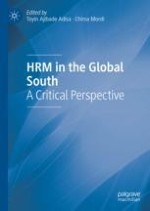2022 | OriginalPaper | Chapter
7. Human Resource Management in Jordan: Challenges and Future Prospects
Authors : Tamara Mohammad, Tamer K. Darwish
Published in: HRM in the Global South
Publisher: Springer International Publishing
Activate our intelligent search to find suitable subject content or patents.
Select sections of text to find matching patents with Artificial Intelligence. powered by
Select sections of text to find additional relevant content using AI-assisted search. powered by
